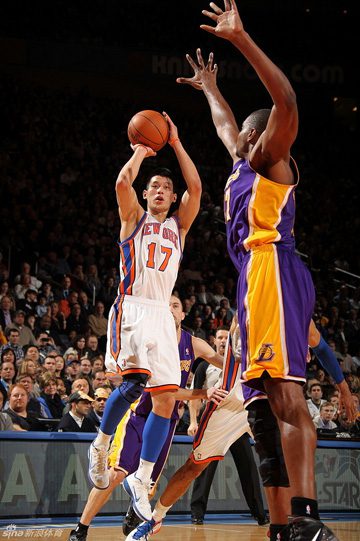Is there a necessary and unavoidable contradiction between sports and faith? David Brooks, one of my favorite cultural commentators, says “Yes!” In his recent New York Times op-ed, “The Jeremy Lin Problem,” Brooks asserts that “The moral ethos of sport is in tension with the moral ethos of faith, whether Jewish, Christian or Muslim.” In fact, the moral ethos of sports “violates the religious ethos on many levels.”

The extraordinary success Jeremy Lin, the New York Knicks’ phenom, is what gets Brooks going. He believes that Lin, a committed Christian, is living in what Brooks calls “a creative contradiction” between his profession and his profession of faith.
Here’s Brooks’ argument in his own words, in a nutshell:
The moral universe of modern sport is oriented around victory and supremacy. The sports hero tries to perform great deeds in order to win glory and fame. . . . He is assertive, proud and intimidating. He makes himself the center of attention when the game is on the line. His identity is built around his prowess.
But there’s no use denying — though many do deny it — that this ethos violates the religious ethos on many levels. The religious ethos is about redemption, self-abnegation and surrender to God.
[Therefore,] the two moral universes are not reconcilable.
Brooks explains further:
Ascent in the sports universe is a straight shot. You set your goal, and you climb toward greatness. But ascent in the religious universe often proceeds by a series of inversions: You have to be willing to lose yourself in order to find yourself; to gain everything you have to be willing to give up everything; the last shall be first; it’s not about you.
Thus, he concludes his column:
Jeremy Lin is now living this creative contradiction. Much of the anger that arises when religion mixes with sport or with politics comes from people who want to deny that this contradiction exists and who want to live in a world in which there is only one morality, one set of qualities and where everything is easy, untragic and clean. Life and religion are more complicated than that.
So, is David Brooks right? Are sports and religion ultimately and essentially incompatible? Is Jeremy Lin, and others like him, most notably Tim Tebow, walking contradictions?
I don’t think Brooks is completely right, though his point is a good one. The ethos of much of sports is about winning, strutting, self-promotion, and individual glory. It’s about being first, not last (Heaven help us, not last!). This ethos does not mesh with that of most religions, including Christianity, in particular. Jesus said things like:
“So those who are last will be first. And those who are first will be last.” (Matthew 20:16)
“Whoever wants to be first among you will be your slave.” (Matthew 20:27)
“All who want to come after me must say no to themselves, take up their cross, and follow me. All who want to save their lives will lose them. But all who lose their lives because of me will find them.” (Matthew 16:24-25)
“You have heard that it was said, You must love your neighborp and hate your enemy. But I say to you, love your enemies and pray for those who harass you.” (Matthew 5:43-44)
Chances are you won’t hear a coach, even a Christian coach, saying things like this to a team before the big game.
So, there is clearly a tension between much of what is valued in sports today and the humility and self-denial that is essential to Christianity and other religious traditions. To deny this tension is to ignore the obvious.
In fact, Jeremy Lin himself acknowledged this tension in an interview with Timothy Dalrymple of Patheos. (I was pleased to see Patheos mentioned in Brooks’ column, when he quoted Lin.) Here’s an excerpt:
Dalrymple: How does your faith shape the way you behave on the court? Are you a different basketball player because you are a Christian?
Lin: Not just in basketball, but I think in life, when you’re called to be a Christian, you’re automatically called to be different from everyone else. In today’s world of basketball, it makes you really different, because the things that society values aren’t necessarily in line with what God values.
Much of it comes down to humility. We as Christians are called to be humble. And if we really understand the gospel, we will be humble. We should be humble, and understand that everything that is good comes from God.
We are also called to turn the other cheek and love our enemies. There are times on the basketball court when people will say things to you, and you just have to bite your tongue and love them. It’s almost as though you have to love then even more, and that love means more if they’re wronged you.
Society focuses so much on individual stats and wins and losses. To a certain extent, you can control those things. But to play for God means to leave the records and the statistics up to Him and give your best effort and allow God to figure out whether you win or lose, whether you play or shoot the ball well that game. So I just try to make sure that I work hard and in a godly way. I prepare myself as well as I can, and at every point during the game I try to submit myself to God and let Him use me.
Lin seeks to play basketball in a way that reflects a different set of values from those that dominate the NBA. He wants to play with humility, to turn the other cheek on the court. He believes he can play basketball “in a godly way.”
Is Lin following himself? Is he naive about the moral ethos of pro basketball? Or it is possible to play professional sports in a way that reflects the ethos of faith?
What do you think? I’d be interest in your comments. I’ll have more to say about this soon.











